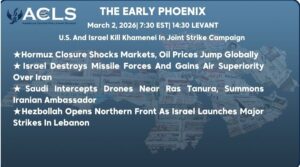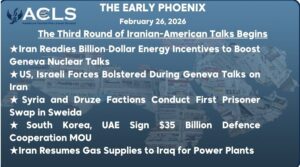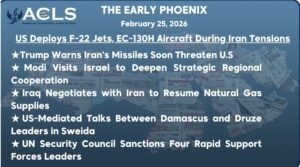Top Headlines:
- IDF Confronts Hamas, PIJ at Gaza’s UNRWA HQ; Soldier Killed
- Israel Targets Hezbollah Air Defenses, Retaliation Kills Civilians
- Al-Baghdadi’s Widow to Be Executed for ISIS Crimes
- Russia and Iran Advance Toward Gas OPEC-Style Cartel Formation
- Houthi Spyware GuardZoo Matches Pegasus in Data Collection
=======================
★ ISRAEL-HEZBOLLAH CRISIS
-
Israel Targets Hezbollah Air Defenses, Retaliation Kills Civilians
The Israeli military launched airstrikes on Hezbollah infrastructure in Lebanon, targeting air defense units and weapon depots in Jinta, Baraashit, and Kafr Kila. In retaliation, Hezbollah attacked Israeli military positions, including the Avivim settlement and a command headquarters in the Golan Heights. Two Israelis were killed by missiles from Lebanon, with around 40 missiles fired towards the Golan. The IDF spokesperson confirmed strikes on Hezbollah air defense infrastructure in Baraachit and Jennata, southern Lebanon. Lebanese sources reported several injuries in Baraachit. Official Lebanese media also reported an IDF missile strike on a target in Nabi Chit, Al-Beqaa district. The IDF has not commented on this latest attack. Hezbollah’s actions followed an Israeli raid on the Damascus-Beirut road that resulted in the death of Nasrallah’s personal bodyguard.
=======================
★ ISRAEL & PALESTINIAN TERRITORIES
-
IDF Confronts Hamas, PIJ at Gaza’s UNRWA HQ; Soldier Killed
The IDF’s 99th Division, supported by Shin Bet, engaged Hamas and Palestinian Islamic Jihad (PIJ) fighters at Gaza City’s UNRWA headquarters, targeting militant infrastructure within the UN facilities. Simultaneously, Sgt. First Class Tal Lahat, 21, of the Maglan commando unit, was fatally shot in a Hamas sniper attack in Tel al-Hawa neighborhood. In Shejaia, the 98th Division eliminated numerous fighters and dismantled tunnel networks, while in Rafah, the 162nd Division disrupted underground routes. Concurrently, the Israel Air Force targeted Hamas militants in central Gaza involved in tunnel and anti-tank missile operations.
-
Israel Aerospace Industries Signs $1 Billion Deal
Israel Aerospace Industries (IAI) has signed a $1 billion military equipment deal with an undisclosed country, expected to conclude by 2029. Reports indicate the deal involves satellites and may be with Morocco. IAI Chairman Amir Peretz is in Morocco, possibly to finalize the agreement. This deal underscores the resilience of Israeli defense industries despite a boycott from French President Emmanuel Macron. The high global demand for military equipment, driven by geopolitical tensions, has boosted the status and success of Israeli defense technologies.
-
Air Haifa to Launch New Airline Service in Northern Israel
Air Haifa, a new Israeli airline, is set to debut with its first ATR 72-600 aircraft arriving at Haifa International Airport from Toulouse, France, in late July. Founded by Israeli entrepreneurs, including Nir Zuk and former El Al executives, the airline aims to operate flights from Haifa to Eilat and Mediterranean destinations. The operational licensing process is expected to conclude by September, followed by ticket sales and commercial flights. This initiative will boost the local economy, create jobs, and enhance air connectivity for northern Israel residents.
-
Expanding Boycott Movement Targets Israel Across Arts, Sports, and Academia
The boycott against Israel is expanding into various new sectors of society, including arts, sports, and academia. This movement is driven by advocacy groups seeking to protest Israeli policies towards Palestinians. It has seen increasing participation from influential cultural and professional institutions worldwide. The growing support for the boycott indicates a significant shift in how Israel’s policies are perceived globally and could have profound implications for its international relations.
-
Israel Denies UN Claims of Weaponizing Starvation in Gaza, Cites Security Concerns
Israel has denied allegations from UN human rights experts that it has weaponized starvation in Gaza, claiming that its blockade and restrictions are necessary for security reasons. Israeli officials assert they allow humanitarian aid into Gaza and accuse the UN experts of bias.
-
Netanyahu and Ben-Gvir Reach Compromise to Avoid Government Crisis
Prime Minister Benjamin Netanyahu and National Security Minister Itamar Ben-Gvir have reached an agreement to avoid a government crisis, despite their policy differences. Netanyahu has pledged to support Ben-Gvir’s Otzma Yehudit party policies in exchange for Ben-Gvir’s cooperation on broader government initiatives. This agreement follows tensions within the coalition regarding judicial reforms and other legislative priorities. The compromise aims to maintain government stability and ensure the passage of key bills.
=======================
★ SYRIA
-
Russian and Iranian Forces Intensify Attacks in Idlib
Russian warplanes resumed bombing near Idlib with high-explosive missiles, ending a 50-day hiatus. No human casualties were reported. The latest attacks follow Russian airstrikes on May 23 in several Idlib and Latakia locations. Concurrently, seven Iranian-made suicide drones targeted Al-Nayrab in Idlib, hitting civilian vehicles and agricultural machinery, with one drone exploding prematurely. Artillery shelling also struck Al-Ruwaiha, with no civilian casualties. The Syrian Civil Defense (White Helmets) noted the rising threat from regime, Russian, and Iranian militia drone attacks, with 41 documented incidents this year primarily affecting Hama, Idlib, and Aleppo.
-
Northeast Syria Welcomes Syrian Refugees from Turkiye, Seeks Global Support
The Autonomous Administration of North and East Syria has announced its readiness to receive Syrian refugees currently in Turkiye. Sheikhmus Ahmed, co-chair of the Office for Displaced Persons, stated that the region’s doors are open to its residents in Turkiye, urging them to return. He called on the UNHCR and the international community to support this initiative and address the violations and attacks on Syrian refugees by the Turkish government. The administration emphasizes its commitment to humanitarian and political initiatives to aid its displaced citizens.
=======================
★ IRAN
-
Russia and Iran Edge Closer to Forming Gas OPEC-Style Cartel
Russia and Iran are progressing towards forming a gas cartel similar to OPEC, aiming to control a significant share of the global natural gas market. This collaboration could influence global gas prices and energy security. The two nations are working on establishing a framework to coordinate gas policies and production strategies, strengthening their positions as major energy suppliers. This potential cartel raises concerns among other gas-producing countries and global energy markets.
-
Iran’s President-elect Pezeshkian Strengthens Ties with Key Allies
Iran’s President-elect Masoud Pezeshkian is actively engaging with international allies to bolster Iran’s foreign relations. He has reached out to Russia, Iraq, Pakistan, and groups like Hamas to introduce himself and strengthen ties. Key discussions include Pezeshkian’s call with Iraqi President Abdul Latif Rashid, emphasizing deep political, economic, cultural, and religious ties. Pakistan’s Prime Minister Shehbaz Sharif expressed readiness to expand bilateral relations, while Russian President Vladimir Putin invited Pezeshkian to the upcoming BRICS summit, highlighting Iran’s pivot towards stronger alliances with Russia and China.
-
IRGC Commander Salami Threatens Escalation of Resistance
In a “40 Years of Struggle” ceremony, IRGC Commander Major General Salami vowed to intensify resistance against adversaries, emphasizing jihad and martyrdom as key to Muslim dignity. He pledged continued IRGC presence in conflict zones, ready to support resistance movements from Yemen, Iraq, Lebanon, Palestine, and Iran against Zionist forces. Salami highlighted the unity symbolized by the sacrifices of Hajj Qassem Soleimani and Abu Mahdi al-Muhandis, reaffirming the IRGC’s commitment to defending Muslim honor and sovereignty.
-
Iran’s Revolutionary Guard Crushes Armed Group in Northwest, Issues Stern Security Warning
Iran’s Revolutionary Guard forces have dismantled an armed group in West Azerbaijan province, reportedly a counter-revolutionary terrorist team attempting to enter from the northwestern borders. Several members of the group were killed or wounded, and their equipment was confiscated. The Guard warned that any threats to Iran’s security and territorial integrity would be met with firm responses. The operation’s exact location was not disclosed, but the area borders Turkiye and Iraq, known for occasional clashes with Kurdish separatists and Daesh-linked militants.
=======================
★ YEMEN
-
Houthi Spyware GuardZoo Matches Pegasus in Data Collection
Houthi rebels in Yemen have developed and deployed a spyware called GuardZoo, which, despite being low-budget and unsophisticated, collects data comparable to the infamous Pegasus spyware. GuardZoo, based on the Dendroid RAT, has been active since at least 2019 and targets military personnel in Yemen, Saudi Arabia, Egypt, and Oman. It spreads through WhatsApp and direct browser downloads, using social engineering to trick users into installation by impersonating legitimate apps and disseminating military-themed content. GuardZoo’s capabilities include stealing photos, documents, device data, and tracking troop movements via geolocation data. Lookout principal researcher Justin Albrecht notes that while GuardZoo is less advanced than Pegasus, it remains a significant threat due to its effective data collection and the growing prevalence of similar government-backed surveillance malware globally.
-
Houthis Launch New Attack on Ship in Bab el-Mandeb Strait
A suspected Houthi rebel attack targeted a ship in the Bab el-Mandeb Strait, causing explosions near the vessel, though no damage or injuries were reported. This follows a period of reduced activity from the Houthis, who recently claimed responsibility for the longest-range attack yet on a US-flagged ship. The escalation comes as the USS Theodore Roosevelt prepares to enter the region, replacing the USS Dwight D. Eisenhower. The Houthis have been targeting vessels since November, claiming their attacks support Hamas in its conflict with Israel.
-
Houthi Group Establishes Baghdad Office
The Yemeni Houthi group has opened an office in Baghdad’s Al-Jadriya district amid regional tensions, raising questions about Iraq’s stance on its relations with Ansar Allah. This development, confirmed by Iraqi officials, aligns with the Houthis’ broader regional strategy. The office’s establishment highlights Iraq’s delicate balance in maintaining national interests while navigating regional dynamics, particularly as the Houthis engage in conflicts involving Israel and Western allies. This move is seen as a significant step in the Houthis’ regional engagement.
=======================
★ TURKIYE
-
Erdogan’s NATO Summit Agenda: Defense Sales and PKK Ties
Turkish President Recep Tayyip Erdogan arrived in Washington for a NATO summit, focusing on removing obstacles to defense sales and increasing pressure on Kurdish groups deemed terrorists by Turkiye. Erdogan emphasized NATO’s need for a decisive fight against terrorism and criticized the exclusion from the F-35 program over the S-400 purchase. Turkish officials also highlighted grievances with U.S. support for the Kurdish-led Syrian Democratic Forces, which Turkiye equates with the PKK.
-
CHP Leader Özel’s Claim of Damascus Visit Unconfirmed by Assad Government
CHP Deputy Chairman Burhanettin Bulut announced that Syrian authorities have allegedly accepted CHP leader Özgür Özel’s request for a visit to Damascus. This visit aims to address the ongoing Syrian refugee crisis and issues related to Turkey’s sovereignty in Syria. Bulut emphasized that initial contacts with Damascus received a positive response, and details regarding the meeting’s timing and location are being finalized. CHP Spokesperson Deniz Yücel confirmed that Özel is scheduled to meet with Assad in July to discuss solutions. However, Syrian media sources have not confirmed this visit.
-
$3.8 Billion in Foreign Financing for Turkiye’s Earthquake Zone
Turkish Finance Minister Mehmet Şimşek announced that $3.8 billion has been secured from international organizations for the reconstruction of the earthquake-affected region centered in Kahramanmaraş. Highlighting the confidence in Turkiye’s potential and adherence to international norms, Şimşek noted significant contributions from entities like the Council of Europe Development Bank and the Japan International Cooperation Agency. These funds will be used for housing, infrastructure, and health improvements. Şimşek emphasized the government’s commitment to rebuilding the area, allocating 1.1 trillion TL in 2023 and similar amounts in the future.
=======================
★ IRAQ
-
Al-Baghdadi’s Widow to Be Executed for ISIS Crimes
An Iraqi court sentenced Asma Fawzi Muhammad al-Kubaisi, the widow of former ISIS leader Abu Bakr al-Baghdadi, to death for collaborating with ISIS. Al-Kubaisi, arrested in Turkiye in 2018 and extradited to Iraq in February, was convicted of detaining Yazidi women in her home, who were later kidnapped by ISIS in Sinjar. She provided crucial information about ISIS operations after her arrest. The Karkh Criminal Court’s decision was based on Iraq’s Anti-Terrorism Law and the Yazidi Survivors Law. Al-Kubaisi, known as “Umm Hudhayfah,” lived with al-Baghdadi in Syria and used a fake identity in Turkiye. Her arrest followed al-Baghdadi’s death in a U.S. strike in 2019, and the court’s ruling reflects ongoing efforts to prosecute ISIS affiliates.
-
Iraqi Resistance Claims Drone Attack on Israeli Power Plant
The Iranian news agency IRNA reported that the Islamic Resistance in Iraq targeted Israel’s Orot Rabin power plant in Hadera with a drone on Wednesday. This follows a similar attack on the same plant on June 8. Additionally, the group claimed a drone strike on a significant target in Eilat on Tuesday, citing retaliation for Israeli actions in Gaza. While these attacks are attributed to Iraqi resistance groups, the ongoing support and involvement of Iran in such operations are implicit. The resistance vows to continue their attacks until Israel ceases its actions in Gaza.
-
Abadi’s Controversial Accusations Spark Political Realignments Ahead of Iraqi Elections
Former Iraqi Prime Minister Haidar Al-Abadi has caused controversy by accusing his former Shiite allies of pressuring him to use armed force against Sadrist protesters in 2016. His claims, denied by the ruling Shiite Coordination Framework, come ahead of upcoming elections and signal possible realignments in Iraq’s political landscape. Abadi’s remarks have sparked debate, with some suggesting he aims to forge new alliances, possibly with Prime Minister Muhammad Shia’ Al-Sudani. This controversy highlights ongoing tensions and potential shifts within Iraq’s Shiite political factions.
-
PKK Establishes Advanced FPV Drone Workshops in Northern Iraq
The PKK has established FPV drone manufacturing workshops in northern Iraq, specifically between Sulaymaniyah and Qandil, utilizing technology from China and Iran. These workshops leverage the PKK’s international connections and financial networks, including supply chains through Ukraine, Europe, Georgia, and Iran. The group aims to enhance and produce drones, integrating advanced signal and receiver systems. This development poses new threats to Turkish military forces, which are adapting their anti-drone defenses in response.
=======================
★ EGYPT
-
Israeli Strikes on Hezbollah Threaten Egypt’s Power Stability
Egypt could face severe power shortages if tensions between Israel and Hezbollah escalate into conflict, analysts warn. With ongoing blackouts already burdening Egyptians during summer, Israel might halt production at key gas fields in the north to safeguard against potential attacks, limiting exports and impacting Egypt’s energy supply. Dependency on Israeli gas has grown significantly, despite Egypt’s previous status as a gas exporter. Issues like underperforming fields and rising consumption have compounded the country’s energy challenges, prompting recent imports to mitigate electricity cuts.
-
African Bank Considers $3.2 Billion Financing for Egypt
The African Export-Import Bank (Afreximbank) is considering $3.2 billion in additional financing for Egypt, which would bring its total facilities for Egyptian banks and companies to $5 billion by year-end. Established 30 years ago and headquartered in Cairo, the bank has provided $12.8 billion in facilities to Egypt over the past three years. The bank is also in talks with the Central Bank of Egypt about joining the Pan-African Payment and Settlement System (PAPSS), a platform facilitating trade between African countries using local currencies. This move aims to strengthen the Egyptian pound and reduce reliance on the US dollar. PAPSS, launched in 2022, connects 13 African central banks and over 115 commercial banks. Egypt’s participation is expected to bolster regional trade and alleviate foreign currency shortages, reflecting the country’s ongoing economic challenges and reliance on international support.
=======================
★ THE GULF
-
Saudi Aramco’s Share Sale Yields $12.35 Billion
Saudi Arabia secured $12.35 billion from the secondary sale of a 0.64% stake in oil giant Aramco, exceeding revenue expectations by $1 billion. The sale included 1.545 billion shares at 27.25 riyals ($7.27) each, along with an additional 154 million shares under a price stabilization option managed by Merrill Lynch. Despite a smaller scale than Aramco’s 2019 IPO, this sale marks a significant revenue boost for the Saudi government, which is pursuing ambitious economic projects amid budget deficits.
=======================
📌 In case you missed it,
📰 THE EARLY PHOENIX July 9, 2024
=======================
🔗 Follow the latest news from the American Center for Levant Studies via Google News



